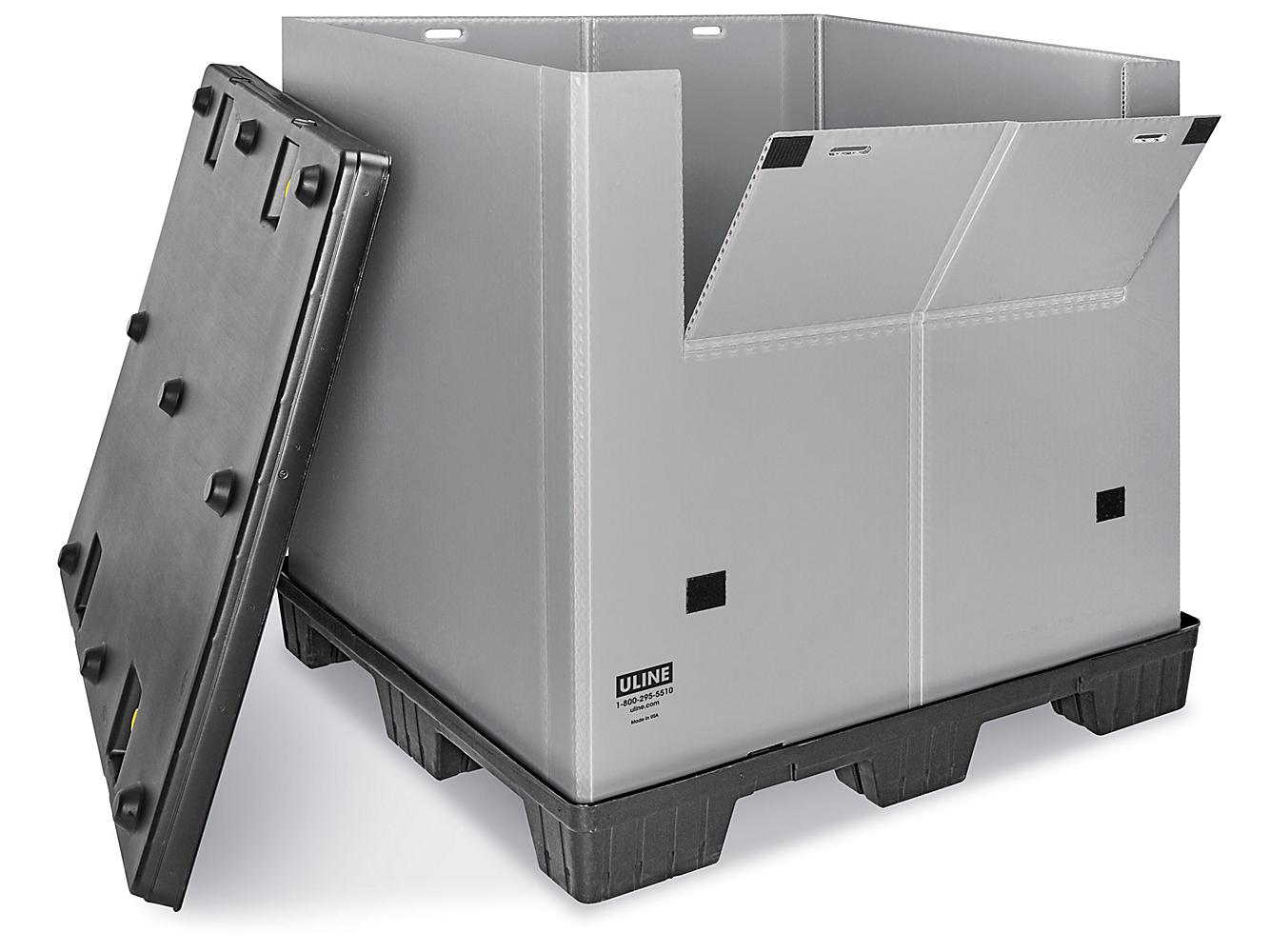Learn the advantages of investing in bulk plastic containers for sale
The Duty of Mass Plastic Containers in Effective Recycling Practices and Sustainability
Bulk plastic containers are indispensable to modern-day recycling efforts. Their style improves the efficiency of product collection and transport, adding to sustainability objectives. These containers not only enhance room but likewise aid in checking contamination levels. Nevertheless, their application is not without difficulties. Understanding the full range of their impact reveals a complicated connection in between logistics and ecological obligation that necessitates more exploration.
Understanding Mass Plastic Containers
Bulk plastic containers function as a necessary component in different markets, assisting in the storage space and transportation of products. These containers are commonly made from durable products such as high-density polyethylene (HDPE) or polypropylene, which give resilience and resistance to ecological aspects. Their style usually consists of features like stackability and modularity, allowing for reliable use space during both storage space and transportation.
Industries such as agriculture, food handling, and manufacturing regularly utilize mass plastic containers as a result of their light-weight nature and ease of handling. The containers come in numerous dimensions and setups, accommodating the certain requirements of different products. Their convenience prolongs beyond mere capability; they can additionally be tailored with lids, manages, and labeling alternatives to enhance usability - Bulk Plastic Containers. As a result, bulk plastic containers play a critical duty in optimizing logistics and supply chain procedures throughout multiple industries, therefore adding to total efficiency and cost-effectiveness
Benefits of Making Use Of Bulk Plastic Containers in Recycling
The utilization of mass plastic containers considerably improves the effectiveness of the procedure when companies focus on recycling initiatives. These containers are made to enhance space, allowing for the storage space and transportation of larger quantities of recyclable products. This leads to less journeys to recycling facilities, thereby decreasing fuel consumption and connected emissions.
Additionally, mass plastic containers are resistant and long lasting to different environmental factors, ensuring that materials continue to be secured during handling and transportation. Their light-weight design even more adds to decrease transportation costs.
In addition, the harmony of these containers facilitates far better sorting and processing of recyclable materials, which can boost total recycling rates - plastic bulk containers. Organizations that take on bulk plastic containers also show a dedication to sustainability, positively affecting their brand name picture. Ultimately, these benefits not just simplify recycling methods yet also add to broader environmental goals
Just How Bulk Plastic Containers Facilitate Product Collection
Efficient product collection is considerably boosted by the usage of bulk plastic containers, as they offer a organized and efficient option for gathering recyclable items. These containers are designed to accommodate big quantities of products, which simplifies the sorting and storage space procedure. Their stackable design takes full advantage of space use, making it less complicated for centers to organize recyclables without mess.
In enhancement, mass plastic containers are sturdy and weather-resistant, permitting outdoor placement without deterioration. This strength ensures that materials stay secured till they are collected for handling.

The harmony in shapes and size of these containers helps with standardization throughout collection factors, making it possible for far better tracking of recyclable quantities. Furthermore, their transparent nature enables simple exposure of contents, assisting in the monitoring of contamination levels and assuring that only ideal products are collected. Overall, mass plastic containers play a crucial function in enhancing the material collection process, therefore advertising efficient reusing practices.
Transportation Efficiency and Environmental Influence
Transport efficiency plays an important duty in the recycling process, specifically with the optimization of load capacity wholesale plastic containers. By optimizing the quantity of product transferred, business can greatly lower the number of trips required, therefore minimizing their carbon impact. This strategy not only enhances functional efficiency yet likewise contributes to a lot more lasting environmental techniques.

Maximizing Lots Ability
Although maximizing tons capacity is frequently ignored, it plays an important function in improving transport efficiency and reducing environmental effect in reusing practices. By making best use of the volume that bulk plastic containers can hold, recycling procedures can decrease the variety of journeys required for transport. This not only reduces fuel intake however additionally lowers the wear and tear on vehicles. Effective tons management enables facilities to utilize area properly, making sure that each transportation cycle is as effective as feasible. Furthermore, well-optimized loads can result in much better negotiations with logistics suppliers, potentially decreasing overall prices. Ultimately, improving load ability adds to a much more lasting recycling system by cultivating reliable source use and minimizing waste created during transportation.
Lowering Carbon Impact
As recycling procedures undertaking to lessen their ecological impact, reducing the carbon footprint connected with transportation emerges as a critical objective. Bulk plastic containers play a crucial duty in accomplishing this objective by improving tons effectiveness and maximizing logistics. Their light-weight yet resilient layout enables optimum freight area application, minimizing the variety of journeys required to deliver products. By settling shipments, reusing centers can lower gas consumption and greenhouse gas discharges. Furthermore, strategically finding recycling facilities minimizes transport ranges, in addition decreasing carbon outputs. Utilizing fuel-efficient cars and different power sources enhances total sustainability. By integrating these methods, the reusing market can significantly decrease its carbon impact, adding to a more lasting future.
Difficulties in making use of Bulk Plastic Containers

Contamination Issues
Contamination issues represent a substantial obstacle in the efficient use mass plastic containers within reusing methods. These containers typically build up more residues from previous components, causing combined materials that can prevent the recycling procedure. Pollutants such as food waste, chemicals, or non-recyclable products can find more compromise the honesty of the entire batch, resulting in increased disposal costs and lowered recycling rates. In addition, incorrect cleaning or sorting can exacerbate these issues, making it challenging for reusing centers to process products efficiently. The visibility of pollutants not just impacts the quality of recycled items yet additionally threatens the total sustainability initiatives focused on decreasing plastic waste. Attending to these contamination obstacles is essential for improving the effectiveness of mass plastic container recycling.
Recycling Facilities Limitations
Ineffectiveness in recycling facilities postures substantial difficulties for the efficient monitoring of bulk plastic containers. Numerous reusing facilities lack the capability to process big volumes of these containers efficiently, resulting in boosted delays and costs. In addition, inadequate sorting innovations usually lead to contamination, as mass containers may be blended with various other materials, making complex the recycling procedure. Restricted transport options likewise hinder the movement of bulk plastic containers to suitable recycling facilities, causing enhanced landfill waste. In addition, a lack of standardized procedures for bulk container recycling produces confusion amongst consumers and organizations, further complicating efforts to promote sustainability. Addressing these infrastructure limitations is vital to enhance recycling techniques and maximize the possibility of bulk plastic containers in a round economy.
Finest Practices for Implementing Mass Plastic Containers
They need to focus on a calculated strategy that improves performance and lowers contamination dangers when organizations think about implementing mass plastic containers in their recycling techniques. Choosing the appropriate container size and type is essential to fit the volume of products being processed. Organizations should likewise establish clear labeling and signage to assist individuals on appropriate disposal techniques, decreasing complication and errors. Normal training sessions for team can better enhance these practices, making certain every person understands their duties see it here in maintaining recycling honesty.
In addition, companies should apply a routine upkeep routine to evaluate and clean containers, avoiding the build-up of pollutants. Partnering with neighborhood reusing facilities can likewise streamline the collection process, making certain that products are successfully processed. Organizations should monitor and review their recycling metrics, utilizing this data to refine practices over time and promote constant improvement in their sustainability initiatives.
The Future of Bulk Plastic Containers in Sustainable Practices
As organizations progressively prioritize sustainability, the role of mass plastic containers in reusing methods is established to progress significantly. Developments in products science are leading to the advancement of recyclable and eco-friendly choices, improving the ecological advantages of bulk plastic containers. Additionally, the execution of closed-loop systems will permit easier collection and repurposing of these containers, lowering waste and resource usage.
Technological developments, such as clever tracking systems, will certainly make it possible for firms to check the lifecycle of bulk containers, enhancing performance in reusing processes. As customer need for lasting techniques expands, organizations will likely embrace bulk plastic containers designed for reuse and long-term value. Cooperation in between sectors and governments will foster the establishment of standardized reusing protocols, guaranteeing that mass containers are effectively incorporated into wider sustainability initiatives. On the whole, the future of mass plastic containers appears encouraging, with significant potential for adding to a circular economic climate.
Often Asked Inquiries
Exactly How Are Bulk Plastic Containers Made and What Products Are Made use of?
Bulk plastic containers are generally made from high-density polyethylene (HDPE) or polypropylene (PP) These products are refined through injection molding or impact molding techniques, causing durable, lightweight containers ideal for various storage and transport requirements.
Can Bulk Plastic Containers Be Recycled Numerous Times Prior To Recycling?
Yes, bulk plastic containers can be recycled several times prior to recycling. Their sturdiness and design enable duplicated usage in different applications, promoting sustainability and source performance while decreasing the demand for new containers.

What Qualifications Exist for Bulk Plastic Containers in Recycling?
Different accreditations for bulk plastic containers consist of the Recycling Collaboration's qualification, the Cradle to Cradle Qualified ™ criterion, and the Sustainable Product packaging Coalition's standards, ensuring containers fulfill specific ecological and recyclability criteria for efficient recycling.
How Do Bulk Plastic Containers Compare to Various Other Recycling Storage Space Options?
Bulk plastic containers provide higher resilience and capacity contrasted to various other recycling storage options, reducing the threat of contamination and helping with reliable transportation. Their design sustains better company, enhancing total efficiency in reusing operations.
What Is the Life-span of a Mass Plastic Container in Recycling Processes?
The lifespan of a bulk plastic container in recycling processes normally varies from 5 to ten years, depending upon usage, worldly high quality, and environmental conditions, enabling several cycles of use before ultimate disposal or recycling.
When companies prioritize recycling efforts, the use of bulk plastic containers considerably boosts the efficiency of the process. Transportation efficiency plays an essential role in the reusing procedure, particularly with the optimization of load capacity in mass plastic containers. The usage of bulk plastic containers in recycling practices faces significant difficulties, particularly concerning contamination concerns and limitations within recycling facilities. Contamination problems represent a substantial challenge in the effective usage of bulk plastic containers within reusing techniques. When organizations think about carrying out mass plastic containers in their reusing techniques, they ought to prioritize a strategic approach that improves efficiency and lowers contamination threats.